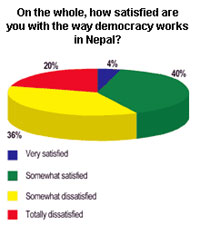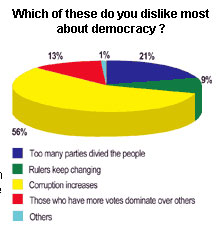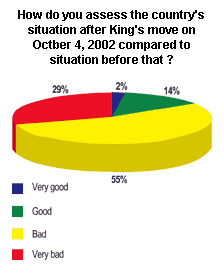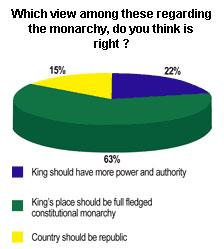 A new nationwide public opinion poll to gauge what Nepalis think about democracy has confirmed previous surveys to show that a majority reject dictatorships. Many want a full-fledged constitutional monarchy and prefer a national rather than an ethnic or regional identity.
A new nationwide public opinion poll to gauge what Nepalis think about democracy has confirmed previous surveys to show that a majority reject dictatorships. Many want a full-fledged constitutional monarchy and prefer a national rather than an ethnic or regional identity.
A majority of Nepalis are in favour of the status quo on the issues of monarchy, religion, state language and state structure. However, the agenda of state restructuring has considerable appeal for a substantial percentage of the respondents, most of them from caste/ethnic, regional and religious minorities.
The 'State of Democracy in South Asia Poll' is a regional exercise to get a baseline evaluation of democracy in Bangladesh, India, Nepal, Pakistan and Sri Lanka. The project was coordinated by the New Delhi-based Centre for the Study of Developing Societies and used a multi-pronged methodology to make a omprehensive  assessment of democracy in the region with a caste-ethnic breakdown. The full results of the Nepal poll will be released on 7 November in Kathmandu.
assessment of democracy in the region with a caste-ethnic breakdown. The full results of the Nepal poll will be released on 7 November in Kathmandu.
In the Nepal poll, most (51 percent) respondents say what democracy means to them is primarily 'freedom, equality and liberty'. A similar proportion think 'basic needs like food, clothes and shelter for everyone' are the most essential characteristics of a democracy. Some 68 percent say freedom of speech and action are what they 'most like' about democracy.
Asked to assess the way democracy works in Nepal, 57 percent are 'somewhat' or 'totally' dissatisfied. A similar proportion draws a correlation between an increase in corruption and democracy. Sixty-one percent of the respondents do not agree with the statement 'everyone enjoys equal rights' in Nepal.  Nearly the same number disagree with the statement that Nepalis 'enjoy freedom of speech without fear'. More than three-fourths think a bulk of Nepalis do not have the basic necessities.
Nearly the same number disagree with the statement that Nepalis 'enjoy freedom of speech without fear'. More than three-fourths think a bulk of Nepalis do not have the basic necessities.
Comparatively, respondents appear more wary of reposing their trust in political parties and parliament than in other state institutions, signifying a lingering memory of post-1990 political instability. In separate questions about the level of trust, the court system scored the highest 'great deal of trust' (30 percent) followed by election commission (26 percent), local government (25.5 percent), the army (25.5 percent), police (21 percent), civil servant (21 percent), central government (19.5 percent), parliament (17 percent), and political parties (14 percent).
Close to two-third of the respondents (62 percent) agree that 'democracy is preferable to any other kind of government' and a full 80 percent feel democracy is 'suitable' or 'very suitable' to Nepal. Only 28 percent  are indifferent and 10 percent said they prefer a dictatorship. Only 16 percent regard the 4 October 2002 move by King Gyanendra as a positive step. A full 84 percent view Nepal's political situation since then as 'bad' or 'very bad'.
are indifferent and 10 percent said they prefer a dictatorship. Only 16 percent regard the 4 October 2002 move by King Gyanendra as a positive step. A full 84 percent view Nepal's political situation since then as 'bad' or 'very bad'.
Even though 51 percent of the respondents say they have no access to mass media (newspapers, radio and television), 80 percent have never taken part in any rallies or demonstrations, and 65 percent say they 'never' discuss politics.
More than two-thirds surveyed say they are 'very proud' about being Nepalis, while 49 percent say they are 'very proud' of their ethnic/regional identity. Ethnic and national identities in Nepal appear to complement each other. Nearly half of those surveyed say they want to identify themselves as 'only Nepali' and only eight percent say they want to opt for 'only ethnic/regional identity'. Nineteen percent like to project their identities as 'equally Nepali and ethnic/regional'.
Most respondents (91 percent) either 'strongly agree' or 'generally agree' with the need for both majority and minorities getting equal treatment and similar numbers agree with 'special treatment and protection to minorities'. Asked if minorities should take up the way of life of the majority, those for and against were nearly 50-50. But there was near-unanimity on the question of gender equality.
Two-thirds of the respondents feel 'generally safe', and only 20 percent say they feel 'fully safe'. Asked what makes them feel insecure, the majority fears 'anti-social elements' (62 percent), followed by 'deteriorating political situation' (21 percent), and only 21 percent say the 'Maoists' make them feel insecure. The 'state' and 'wild animals' ranked next with 14 percent each.
On the whole, Nepali citizens seem to feel more comfortable with the economic condition of their own household than that of the country. The ratio of household and national economic condition is 55:31 for 'satisfied', 38:13 'better than past', and 53:37 'will be better in the future'. Surprisingly, the people feel individually better off, and have more hopes for themselves than for the nation.
Most respondents seem to be in favour of public sector involvement in industries, transportation, electricity and water. Most think the civil service should not be trimmed, and only a quarter favour privatisation. Nearly 60 percent of the respondents are in favour of foreign direct investment, the rest oppose it.
Asked about possible solutions to the conflict, among those who responded with definite answers, 69 percent favour a 'roundtable conference', 22.5 percent want new elections, and only 5.5 percent want a reinstatement of parliament.
Among those who responded with definite answers (treating 'could not understand' and 'no opinion' as missing variables), a clear majority of the respondents (51 percent) are in favour of framing a new constitution, 40 percent want the present constitution amended and only nine percent are satisfied with it. Among those who prescribe a new constitution, three-fourths are in favour of elections for a constituent assembly.
As in earlier public opinion suveys, 63 percent want the king to be a 'full-fledged constitutional monarch'. Twenty-two percent wanted him to have more power and authority and 15.5 percent are in favour of a republic. Two-thirds of the total respondents want Nepal to be a Hindu state (73 percent of the Hindu respondents) whereas most non-Hindus wanted the country to be secular.
A majority is in favour of the status quo in retaining Nepali as the 'sole official language' but 31 percent favour recognition of other official languages and 16 percent want local languages for local governance. Most respondents want Nepal to remain a unitary state, only 24 are in favour of federalism and 8.5 percent are in favour of ethnic autonomy.
The full report is being released next week by the State of Democracy in South Asia Nepal. Contact: 5535038.
METHODOLOGY
The survey was conducted from 6 August-20 September in 163 polling stations, 31 in urban and 132 in rural areas, spread over 39 parliamentary constituencies of 38 districts. Face-to-face interviews based on a structured questionnaires were conducted with a nationwide sample of 3,249 respondents. Of them, 45.5 percent were male, 54.5 percent female. Eighty percent were rural, and 45 percent illiterate. Hill caste (including Newar) made up 40.4 percent of the respondents, tarai caste were 14.7 percent, hill ethnic were 17.4 percent, tarai ethnic made up 4.5 percent. Hill dalit were 6.3 percent, tarai dalit 3.8, and Muslim 3.2. Religion-wise, 83.4 percent were Hindus, nine percent Buddhist, three percent Muslim, three percent Kirat and one percent Christian.


